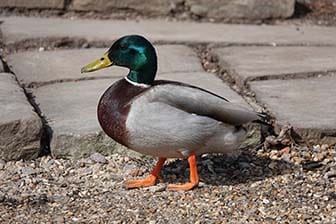Key points
- Swimmers might come in contact with bird droppings (poop) while in the pool.
- If you find bird droppings in the pool, there are a few simple steps you can take to disinfect the water and keep birds away from the pool.

Overview
Many germs that might be found in bird droppings can infect humans. Duck and goose droppings, in particular, might contain germs such as E. coli, Salmonella, Campylobacter, or Cryptosporidium ("Crypto" for short). Most germs in bird droppings are killed by chlorine within minutes in a well-maintained pool.
The germ Crypto, however, has a tough outer shell that allows it to survive for a long time in the environment. Crypto can survive for days even in properly chlorinated pools. Currently, CDC is not aware of any evidence of Crypto being spread directly from birds to humans.
Steps to take
Pool operators and owners should respond to finding bird droppings in the pool the same way they would respond to finding formed human feces (poop) in the pool. CDC's Fecal Incident Response Recommendations [4 pages] provide step-by-step guidance on how to properly decontaminate the water in these situations.
Follow these steps to remove bird droppings and disinfect the water
- Close the pool to swimmers.
- Put on disposable gloves.
- Remove the bird poop using a net. Do not vacuum the poop from the pool—vacuums cannot be cleaned and disinfected thoroughly.
- Clean off any debris or dirt from the net used to remove the bird poop.
- Remove and dispose of gloves.
- Wash your hands thoroughly with soap and water.
- Raise the free chlorine concentration to, or maintain it at, 2 parts per million (ppm); maintain the water pH at 7.5 or less; keep the temperature at 77°F (25°C) or higher. The free chlorine and pH should remain at these levels for 30 minutes.
- Confirm that the filtration system is operating properly.
How to keep birds, ducks, and geese away
Steps to encourage birds to leave the swimming pool area
- Remove plants that produce edible nuts, fruits, and berries.
- Remove bird feeders.
- Trim or remove trees and shrubs to limit branches hanging around or over the pool that can be used by roosting birds.
Steps to encourage ducks or geese to leave the swimming pool area
Do not feed ducks or geese; providing food attracts them and encourages them to return. Many types of ducks and geese eat grass, so reducing the area of grass lawns around the swimming pool or putting up barriers that prohibit movement between swimming pools and grass lawns, such as fences and hedges, might also help. Removing domestic ducks and geese from the pool area can also help decrease the likelihood that wild ducks and geese will be attracted to the area.
